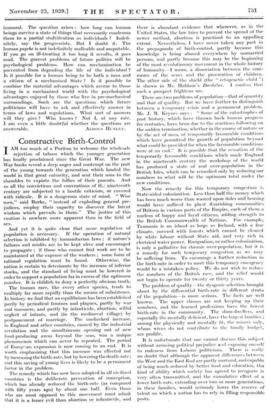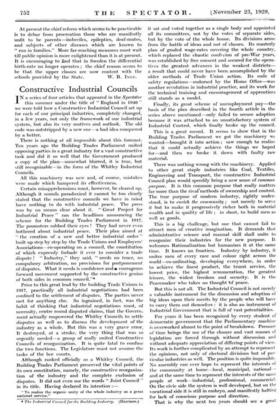Constructive Birth-Control
TAM too much of a Puritan to welcome the wholesale 1 rejection of taboos which the younger generation has loudly proclaimed since the Great War. The new War bOoks reveal a deep anger and contempt on the part of the young towards the generation which landed the world in that great calamity, and sent their sons to the shambles to expiate the follies of their parents. And so all the convictions and conventions of the nineteenth Century are subjected to a hostile criticism, or covered with ridicule. - It is a dangerous state of mind. .-" Wise n, me" said Burke, "instead of exploding general pre- . , judices, employ their sagacity to discover the latent wisdom which prevails -in: them," . The justice- of this caution is nowhere more apparent than in the field of sex. - And yet it is quite clear that some regulation of population is necessary. If the operation of natural selection is inhibited by. humanitarian laws ; if nature's -failures and misfits are to be kept alive and encouraged to propagate ; if those who cannot find work are to be -Maintained at the expense of the workers ; some form of rational regulation must be found. Otherwise, the nation is certain to deteriorate by the increase of inferior stocks, and the standard of living must be lowered in order to support a population far in excess of the optimum number. It is childish to deny a perfectly obvious truth.
The human race, like every other species, tends to multiply far more rapidly than the means of subsistence. In history we find that an equilibrium has been established 'partly by periodical famines and plagues, partly by war and Massacre, and partly by infanticide, abortion, wilful neglect of infants, - and (in the mediaeval village) by -postponement of marriage. The unchecked- increase, in England and other countries, caused by the industrial revolution and the simultaneous opening out of new food-producing areas beyond the seas, was a unique phenomenon which can never be repeated. The period of European expansion is now coming to an end. It is worth emphasizing that this increase -was effected not by increasing the birth-rate, but by lowering the death-rate ; and this saving of young lives is likely to be a permanent factor in the problem.
The remedy which has now been adopted in all civilized countries is the deliberate prevention of conception, which has already reduced the birth-rate (as compared with fifty years ago) by about one half. Even those who are most opposed to this movement must admit that it is a lesser' evil than abortion or infanticide, and there is abundant evidence that wherever, as in the United States, the law tries to prevent the spread of the newer method, abortion is practised to an appalling extent. Nevertheless, I have never taken any part in the propaganda of birth-control, partly because this knowledge is being abused everywhere by unmarried persons, and partly because this may be the beginning of the most revolutionary movement in the whole history of humanity—I mean, a dissociation between the com- merce of the sexes and the procreation of children. The other side of the shield (the " ectogenetic child ") is shown in Mr. Ihldane's Daedalus: I confess that such a prospect frightens me.
There are two problems of population—that of quantity and that of quality. But we have further to distinguish between a temporary crisis and a permanent problem. Mr. J. M. Keynes says : " Sonic of the catastrophes of past history, which have thrown back human progress for centuries, have been due to the reactions following on the sudden termination; whether in the course of nature or by the act of man, of temporarily favourable conditions which have permitted the growth of population beyond what could be provided for when the favourable conditions . • were at an end." It is possible that the cessation of the temporarily favourable conditions which made England in the nineteenth century the workshop of the world has produced a state of real over-population in the British Isles, which can be remedied only by reducing our numbers to what will be the optimum total under the new conditions.
Now the remedy for, this temporary- congestion is State-aided colonization. Less than half the money which has been much worse than wasted upon-doles and housing would have' sufficed to plant flourishing communities of Britons in various parts of the Empire, each of them a nucleus of happy and loyal citizens, adding strength to the British Commonwealth of Nations. For example, Tasmania is an island as large. as Ireland, with a fine climate, covered . with forests which cannot be cleared by white labour without State aid, and very rich in electrical water power. Emigration; or rather colonization, is only a palliative. for chronic over-population, but it is a remedy for such temporary congestion as we may be suffering from. To encourage a further reduction in the birth-rate in order to meet this temporary -emergency would be a 'mistaken policy. We do not wish to reduce the numbers of the British race, and the relief would not begin to operate for twenty or thirty years.
The problem of quality—the dysgenic selection brought about by the differential birth-rate in different strata of the population—is more serious. The facts are well known. The upper classes are not keeping up their numbers, and the • learned professions have the lowest birth-rate in the community. The slum-dwellers, and ,especially the mentally deficient, have the largest families ; among the physically and mentally fit, the miners only, 'whose wives 'do not contribute to the family budget, are prolific.
It is unfortunate that one cannot discuss this subject without arousing political prejudice and exposing oneself to rudeness from Labour politicians. There is really no doubt that although the apparent differences between the West and the East End are partly nurtural, and capable of being much reduced by better food and education, the kind of ability which society has agreed to recognize is very often transmitted, and the cumulative effect of a lower birth-rate, extending over two or more generations, in these families, would seriously lower the reserve of talent on which a nation has to rely in filling responsible posts. At present the chief reform which seems to be practicable is to debar from procreation those who are manifestly unfit to be parents—imbeciles, epileptics, deaf-mutes, and subjects of other diseases which are known to " run in families." More far-reaching measures must wait till public opinion is more enlightened than it is at present. It is encouraging to find that in Sweden the differential birth-rate no longer operates ; the chief reason seems to be that the upper classes are now content with the schools provided by the State. W. R. INGE.































































 Previous page
Previous page